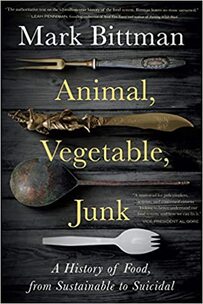|
A summary and review of Animal, Vegetable, Junk by Mark Bittman. Written by guest feature Gregory Barnes.  We dig into Mark Bittman's world history of food when our Homo erectus ancestors improved their food hunting and gathering efficiency some 6 million years ago, now using only two feet for mobility. Bittman continues with important topics: "Food affects everything", "Agriculture is an eternal experiment," and "Soil and Civilization." About seventy thousand years ago, Homo sapiens survived along with Neanderthals eating what they could find in Eurasia, later roaming deeper into Europe and Asia with crude tools, fire for cooking, and new, larger brains! Agricultural Revolutions 10,000 BCE to 2021CE (Before and during the Common Era.) The farming innovations of the early agricultural revolution greatly improved land productivity with organized planting, while making human communities possible, especially In Mesopotamia, the "Fertile Crescent" of Southwest Asia. About 10,000 BCE, human populations and agriculture expanded widely in England, India, China, Central America and the Andes. This Neolithic/Agricultural "Revolution" was of "inestimable importance" in human history. But was it ultimately good for us a millennia or two later? Below, two-historians join with Bittman to answer that question: The Agricultural Revolution was "The worst mistake in the history of the human race." - Historian Jared Diamond, author of Guns, Germs and Steel The Agricultural Revolution was "History's biggest fraud." - Yuval Noah Harari, Historian/Author of SAPIENS First, to cover the basics, keep in mind that the main reason we eat is because NUTRITION= ENERGY! Now, Bittman explains that as agriculture became organized and mechanized over the last three centuries, family farms grew into today's factory farms, dependent on sales to capitalized megamarkets at ever-increasing distances. This later agricultural revolution didn't end with the 18th century! Profit was its goal, driven by innovation then as now, much of it is not good for soil, plants or nutrients for humans. There were also new mechanized needs for animals down on the farm; they've been industrialized, too, and their life on factory farms is not exactly idyllic. Farm"stock" now has a new capitalistic meaning. Ubiquitous chemicals, fertilizers and pesticides, once-upon-a time organic, but no longer. Growth hormones, anything that would hasten growth (and certain death) of any animal or plant intended as food for people including GMO's (Genetically Modified Organisms). The food chemistry is truly revolutionary, but is it good for today's man or beast -or woman or plant? These three experts say "NO." Agriculture starts World-wide trade -Europe in the Middle Ages and beyond Bittman paints Medieval farming done primarily by peasants on small plots of land owned by their Lords who decided how much each would get. Guess who went hungry! Starvation was common, France alone suffered 26 famines during the eleventh century. Diets were poor and families often spent everything on food. Despite shortages, Western Europe would remerge as a global superpower after the plague of 1737 killed some twenty million.Yet the stage was set for world-wide trade and future globalization. HELLO to the New World: America, Sugar, and Slavery HELLO to Factory Farms, monoculture, and Caribbean Sugar Goodbye, Nutrition and Family Farm Sugar became the primary commodity in the Atlantic trade. No matter how much was produced, America was always ready to ship more, especially after human slaves also became a commodity (bought with money), and worked for no pay. Bittman summarizes Sugarmania: "In 1700 England's annual per capita consumption of sugar was about five pounds. By 1800 it was nearly twenty, and in 1900, nearly a hundred pounds. Annual sugar consumption in the U.S. is over one hundred pounds even now.Sugar scholar Sidney Mintz says "The English quickly understood that "the whole process- from the establishment of colonies, the seizure of slaves, the amassing of capital,the protecting of shipping, and all else took shape under the wing of the state."Thus, the world's most far-reaching and powerful empire was born on the backs of Brown and Black humans. What began as a brutal way to produce food for the rich helped establish a tragic pattern of global food production that became the norm. Slavery's impact in America can hardly be overstated. Food was no longer something you cultivated outside your door to feed your community. It was produced far afield, by exploited labor overseen by strangers, then shipped in previously unimaginable quantities to supply huge markets. It didn't take long for the Americas to become the center of this kind of food production. And the costs to nature and humans especially were even more staggering than the profits." It was left to indigenous American farmers to continue growing food in the traditional ways of their ancestors, and many dedicated, diehard traditionalists to gently hold on to the old ways as long as possible. Some of their descendants are still at it, producing food at little cost to nature and staggering benefits to human nutrition and energy. This feature blog piece is a review of A History of Food, from Sustainable to Suicidal by Mark Bittman. It was summarized by Gregory Barnes for the purposes of being shared as part of this blog. His hope is to provide insight into the flaws of modern agriculture by giving an overview of its history and how it developed into the system in place today. Thanks for reading! -Jordan Tisaranni
1 Comment
|
Archives
July 2021
Categories |

 RSS Feed
RSS Feed